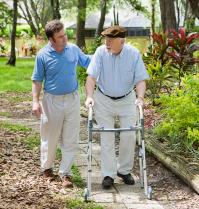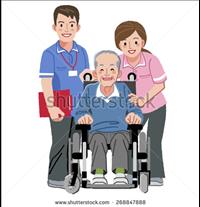|
Adult Children Caregivers
Monday, February 20, 2023
 Recently, our former president, Jimmy Carter, decided to stop his own life-sustaining treatments to receive at-home hospice care so he can spend his final days surrounded by family and friends. When I was serving as my father’s healthcare surrogate, I had to make the decision to enroll him in hospice services at the end of his life.Whether or not to enroll a family member in hospice care is an issue that many families face and it can be very confusing. Here is an article outlining what hospice is, how to find one, and also how to spot a hospice company that might be practicing some Medicare fraud: When faced with a terminal illness or condition, more people than ever are choosing hospice care over starting or continuing expensive medical treatments. Hospice care is for patients who choose not to undergo specific treatments or when they are no longer effective.
Read more . . .
Wednesday, June 22, 2022
7243.jpg) ABLE (Achieving a Better Life Experience) accounts offer people with disabilities a great, tax-free way to accumulate money without jeopardizing their qualifications for Supplemental Security Income (SSI) and other means-tested programs. Withdrawals are tax-free as long as the money is used for “qualified disability expenses.” The arguments for starting and maintaining such funds are overwhelming, not least of which is the wide variety of things on which the money can be spent. To build 529A ABLE accounts, beneficiaries (and other contributors) can put up to $16,000 total into these funds each year. Read more . . .
Monday, June 6, 2022
Writing Instructions to Potential Guardians If you have minor children, or children with disabilities, the thought of leaving them suddenly is unimaginable. Parents know their children- their schedules, their health, their likes and dislikes- but keep most of that knowledge in their heads. When my kids were growing up, I knew when they needed to be at soccer practice and church, who their doctor was and how to reach her, and how to tell when they were sick. Other than abbreviations on my calendar and names in my database, there was no formal written schedule of activities or list of important contacts. Most parents can’t imagine how someone would be able to step in and take care of their children. Read more . . .
Wednesday, March 18, 2020
 While we don’t believe that anyone should panic, we do want to encourage anyone with older or immuno-compromised loved ones to be prepared.
The CDC is encouraging everyone to have extra food and supplies on hand, in the event of sudden closures or quarantines. Please take the time to check on any seniors or people in your life who are ill/disabled to see if they need help getting things together. Key items to gather include: Prescriptions and any over-the-counter medications Those with breathing problems should ensure that any devices they use (nebulizer, oxygen) are working properly and they have enough medication on hand to power any devices. A two-week supply of food Drinks with electrolytes in the event the flu or another illness is contracted Nutrition drinks such as Ensure for seniors Lysol, disinfecting agents, and anti-bacterial soap Extra toilet paper Pet food for at least two weeks Adult diapers, feminine products, and any other necessary supplies
Finally, it’s a wise idea to make copies of your loved one’s insurance cards and make sure that you can put your hands on any Powers of Attorney and Healthcare Directives that would allow you to legally communicate with doctors and make financial and medical decisions on your loved one’s behalf. Read more . . .
Friday, February 7, 2020
 My favorite hobby is reading and I try to combine my love of reading with my profession of estate planning. The plots of some of my favorite books are about dysfunctional family relationships complicated by really bad estate planning!Here are three books I recommend where siblings were torn apart by their parents’ bad estate planning choices.The Nestby Cynthia D’Aprix SweeneyThe four siblings of the Plumb family - Leo, Melody, Beatrice, and Jack- are the beneficiaries of a trust fund they call “The Nest” left to them by their father. The terms of the trust provide that the trust assets will be distributed equally to the four siblings when the youngest, Melody, reaches age 40. When the book begins, Melody is fast-approaching her 40th birthday, and each of the siblings is anxiously awaiting the distribution that could solve their self-inflicted life problems.
Read more . . .
Wednesday, December 4, 2019
 Happy Holidays! Is It Time to Have a Conversation About Long-term Care with an Aging Parent?Like many families, mine is scattered all over the United States. Work and other commitments make it difficult to visit distant loved ones more than a few times a year. When visiting, it is hard to gauge the health and safety of family members because they are often not going about their normal daily activities. A few years ago, while visiting my dad in Oregon, I noticed that there was something not quite right with him. He was repeating himself and telling stories about his history that I was pretty sure were not true.Read more . . .
Monday, November 11, 2019
There are not enough hours in the day – a familiar phrase I mutter to myself while trying to accomplish the items on my ever-expanding to-do list. That phrase may really be true for those caring for a family member with disabilities. Although I haven’t found a way to add hours to my day, I have found ways to extend the time available for learning new things. I’ve discovered that I can listen to podcasts and books while doing tasks that require my physical -but not necessarily my mental – presence. I listen to podcasts when I’m running, doing laundry or cooking, or while I’m wandering around Trader Joe’s picking up groceries. Read more . . .
Monday, June 26, 2017
To help your parents get their affairs in order, you should first make sure that you or someone trustworthy has the legal ability to manage your parent’s affairs. This article is a guide to the four fundamental legal documents you and your parent may need in order to get financial affairs in order. Read more . . .
Thursday, July 23, 2015
 July is SANDWICH GENERATION AWARENESS MONTH The Sandwich Generation refers to those caregivers, generally between the ages of 45 and 59, who are caring for aging parents while also caring for young children or dependent young adult children. One of the issues facing many of those caregivers is how to pay for the aging parent’s long-term care needs. Long-term care refers to ongoing assistance to meet some of the basic activities of daily living, such as bathing, eating, dressing, using the toilet, transferring from bed or chair, caring for incontinence or eating. The type and cost of long-term care depends on the services necessary for the health and safety of the person. Keep in mind that Medicare does not pay for long-term custodial care.
Read more . . .
The Elrod-Hill Law Firm,LLC assists clients with Estate Planning, Veterans Benefits, Medicaid, Elder Care Law, Probate, Special Needs Planning and Pet Trusts in the North Atlanta area including the counties of Dekalb, Gwinnett and Fulton.
|

|
|
|